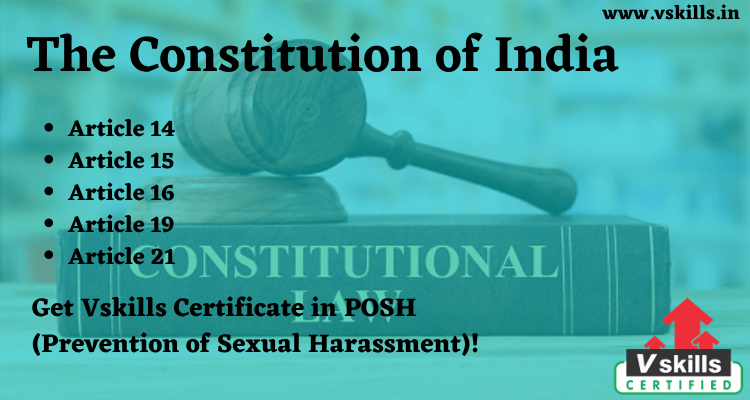
The right to equality and prohibition of discrimination on the ground of sex guaranteed by the Constitution of a number of countries of the world provide protection against sexual harassment of women at the workplace because it amounts to sex-based discrimination and negation of the right to equality of women to work equally with men.
The victim can claim protection against sexual harassment under the following articles:
Article 14: Equality before the law
Article 14 of the constitution guarantees to every person the right to equality before the law and equal protection of the laws.
Article 15: Prohibition of Discrimination of Grounds of Religion, Race, Caste, sex of place of birth
According to Article 15(1), the state shall not discriminate on grounds of religion, race, caste, sex or place of birth or any of them.
Article 16: Equality of Opportunity in Matters of Public Employment
The main object of Article 16 is to create a constitutional right to inequality of opportunity and employment in public offices. Articles 15 and 16 are instances of the same right in favor of citizens in some special circumstances.
Article 19: Protection of certain rights regarding freedom of speech etc.
Gender discrimination in employment adversely affects a woman’s freedom to carry out her occupation. The Supreme Court has struck down gender discrimination employment on several occasions. In C B Muthamma, I.F.S. vs. Union of India, service rules that placed an unfair burden on women were labeled as discriminatory.
Article 21: Protection of life and personal liberty
In Maneka Gandhi vs. Union of India, 112 the court gave a new dimension to Article 21. It held that the right to ‘live’ is not merely confined to physical existence but it includes within its ambit the right to live with human dignity. The Supreme Court in Francis Coralie. Union Territory of Delhi,113 said that the right to live is not restricted to a mere animal existence. It means something more than just physical survival.
 Stay Ahead with the Power of Upskilling - Invest in Yourself!
Stay Ahead with the Power of Upskilling - Invest in Yourself! 


